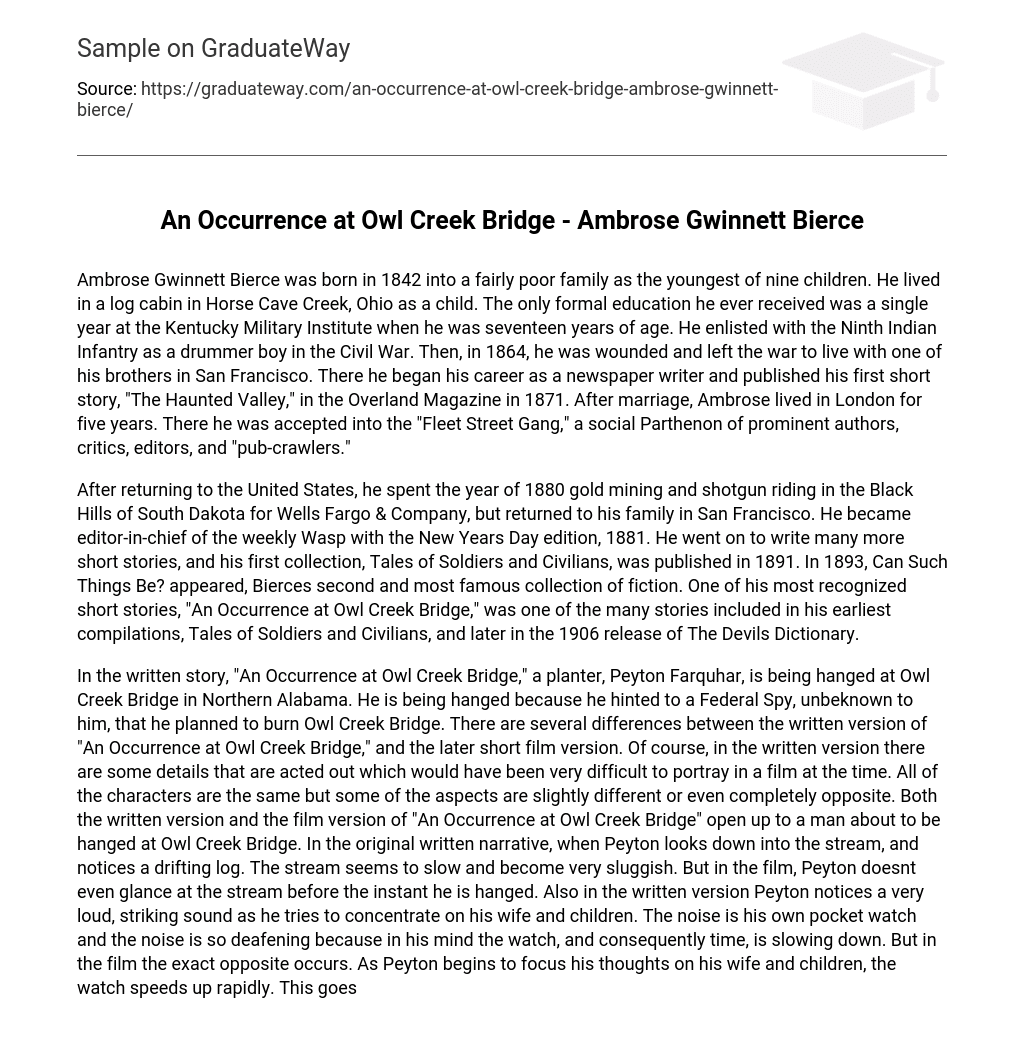Ambrose Gwinnett Bierce was born in 1842 into a fairly poor family as the youngest of nine children. He lived in a log cabin in Horse Cave Creek, Ohio as a child. The only formal education he ever received was a single year at the Kentucky Military Institute when he was seventeen years of age. He enlisted with the Ninth Indian Infantry as a drummer boy in the Civil War. Then, in 1864, he was wounded and left the war to live with one of his brothers in San Francisco. There he began his career as a newspaper writer and published his first short story, “The Haunted Valley,” in the Overland Magazine in 1871. After marriage, Ambrose lived in London for five years. There he was accepted into the “Fleet Street Gang,” a social Parthenon of prominent authors, critics, editors, and “pub-crawlers.”
After returning to the United States, he spent the year of 1880 gold mining and shotgun riding in the Black Hills of South Dakota for Wells Fargo & Company, but returned to his family in San Francisco. He became editor-in-chief of the weekly Wasp with the New Years Day edition, 1881. He went on to write many more short stories, and his first collection, Tales of Soldiers and Civilians, was published in 1891. In 1893, Can Such Things Be? appeared, Bierces second and most famous collection of fiction. One of his most recognized short stories, “An Occurrence at Owl Creek Bridge,” was one of the many stories included in his earliest compilations, Tales of Soldiers and Civilians, and later in the 1906 release of The Devils Dictionary.
In the written story, “An Occurrence at Owl Creek Bridge,” a planter, Peyton Farquhar, is being hanged at Owl Creek Bridge in Northern Alabama. He is being hanged because he hinted to a Federal Spy, unbeknown to him, that he planned to burn Owl Creek Bridge. There are several differences between the written version of “An Occurrence at Owl Creek Bridge,” and the later short film version. Of course, in the written version there are some details that are acted out which would have been very difficult to portray in a film at the time. All of the characters are the same but some of the aspects are slightly different or even completely opposite. Both the written version and the film version of “An Occurrence at Owl Creek Bridge” open up to a man about to be hanged at Owl Creek Bridge. In the original written narrative, when Peyton looks down into the stream, and notices a drifting log. The stream seems to slow and become very sluggish. But in the film, Peyton doesnt even glance at the stream before the instant he is hanged. Also in the written version Peyton notices a very loud, striking sound as he tries to concentrate on his wife and children. The noise is his own pocket watch and the noise is so deafening because in his mind the watch, and consequently time, is slowing down. But in the film the exact opposite occurs. As Peyton begins to focus his thoughts on his wife and children, the watch speeds up rapidly. This goes on in conflicting directions in both accounts until in the film version his watch is seized by one of the officers, and in the written version his thoughts turn to those of escape. At this point in the written version, the sergeant steps off of the plank keeping Peyton aloft and the story goes back in time to tell about Peyton and his family. In the written account Peyton and his wife are sitting enjoying the evening when a grey-clad soldier rides up and inquires about a drink of water.
Mrs. Farquhar goes to fetch some water and Peyton inadvertently hints that he is planning to burn Owl Creek Bridge. The grey-clad soldier was a Federal Spy. But in the film when the sergeant steps off of the plank, Peyton simply falls and the rope breaks and he plunges into the water. In the written depiction, after the interaction with the Federal spy, the story returns to Peyton falling into the water also. Additionally, in the written account, Peyton is being hanged so that he falls through the ties of the bridge, but in the film he is being hanged out to the side of the bridge. Also in the original written tale Peyton looks back after falling into the water and freeing himself of the ties around his hands, feet, and neck and sees that one of the sentinels firing at him has grey eyes. There is no mention of the sentinel with grey eyes in the film. But from this point on the written and film versions are very similar if not exactly the same. In both accounts he dodges all of the bullets and makes it out of the water onto the sandy bank. He runs through the woods and ends up walking all night until he finally reaches his house. Just before he reaches his wife to embrace her, he is thrown back into reality and he swings by his neck from Owl Creek Bridge.
Many short stories have been made into short films or movies over the years. The story “An Occurrence at Owl Creek Bridge” was written in 1891 by Ambrose Gwinnett Bierce and later made into a short film, which was later aired by The Twilight Zone. There are many differences between the film and written accounts. But these differences are to be expected, especially in the time which this film was made, because some occurrences are more easily written than they are physically portrayed for a movie. But despite the differences, the general idea of the story created by Bierce is not lost in the films account.





